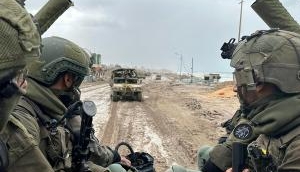Photographic tricks won't be enough. Can Nawaz bell Pak army's new top cat?

'If a picture paints a thousand words...'
Telly Savalas, the film and TV actor of yesteryear, would never have imagined that a line from his famous song 'If', would come to life in the most unlikely of places - Pakistan.
But it has.
Three photographs tell a tale of the state of play of civilian-military relations in Pakistan.
The first was taken at the farewell dinner hosted by Prime Minister Nawaz Sharif for outgoing army chief General Raheel Sharif. It shows the two of them sitting adjacent to each other, as equals - like two heads of government or states.

The second photograph shows General Qamar Javed Bajwa meeting Nawaz after he was picked to be the new army chief.

The two are sitting across an empty table, clearly showing that Nawaz is the boss and the army chief-designate is meeting him. Contrast this with the first photograph, and the message is loud and clear.
The third photograph is of Gen. Bajwa saluting Nawaz when he went to call on him after he was appointed as the army chief. This was taken a few moments before the second photograph.

Interestingly, the official photograph released by the PM's house shows Nawaz shaking hands with the army chief-designate.
Like the leaked Dawn news story in October, the above photograph was leaked to the media, and not released officially. The leak could only have come from the PM's house, because the photographer is clearly standing behind the PM.
Nawaz in control?
There should be nothing unusual in an army chief saluting the head of government, but in Pakistan's case, it is.
Nawaz has admitted in a TV interview that on several occasions, he had noticed that army officers did not deliberately wear caps, so that they did not have to salute him. For him, being saluted by the army chief is a big deal. That why the devious manner of the release of the third photograph.
These three photographs clearly reveal the impression the government is trying to create. It is that under the new chief, it would be Nawaz who would be in control, and who will henceforth call the shots. This would be in sharp contrast to the way things were under Gen. Raheel.
Nawaz has personal reasons to assert civilian supremacy over the army. He could have hardly forgotten how he was removed, along with then-President Ghulam Ishaq Khan, by one army chief, Gen. Waheed Kakar, and later overthrown in a military coup by Gen. Pervez Musharraf, another army chief.
Running down Raheel
The outgoing chief, Gen. Raheel, enjoyed unprecedented popularity due to leading from the front. This overshadowed the civilian government, and created an imbalance in civil-military relations.
It is interesting that even before Gen. Raheel had officially handed over charge, a vilification campaign against him had begun. This will probably intensify in the days ahead. The primary purpose of this campaign is to run down his reputation, and especially his popularity, which contrasted harshly with that of Nawaz.
For example, a particularly nasty article in the News, on 27 November, had this to say:
"...the new chief has to revive the army's institutionalised decision and planning mechanism that has been severely damaged by General Raheel's endless self-projection and self-centeredness."
"...he allowed his name to float around scandalously close to the constitutionally alien territory."
"This was accompanied by deliberate myth-building around Gen. Raheel as the 'greatest general' to have ever walked the face of this country."
The article even raised questions of financial propriety by saying that the North Waziristan operation was initially meant to be for two months and cost 25 billion rupees. "How come it got stretched to two and half years with a 200 billion rupee bill without any closure in sight?"
It termed the army's big claims of successes in Operation Zarb-e-Azb as a "pompous parade of achievements".
Building up Bajwa
In contrast, Gen. Bajwa is being made out as one who would not try to assert his personality in order to dominate the political scene, or constantly be in the media. It has been reported that he is more reserved than his predecessor, and that he would seek harmonious relations with the government.
In other words, not grab the media's attention as Gen. Raheel did.
In fact, the myth-making about Gen. Bajwa has already begun. Whether or not it is being orchestrated by the PM's media cell is a moot point.
Two elements of it are:
1. Gen. Bajwa is a staunch believer in democracy, and believes in giving the civilians space. In this context, he is said to have played a positive role as X Corp Commander, Rawalpindi, in 2014, during the dharna by Imran Khan and Tahirul Qadri.
2. He does not have a singular, visceral hatred for India. He believes that non-state actors are the biggest threat to the country.
However, the issues that Gen. Raheel faced vis-a-vis the civilian government are not going to go away just because of the change in command. The failure of the civilian government to fully implement the National Action Plan (NAP), the need for an operation in Punjab, the Dawn leaks story etc, are issues that will make Gen. Bajwa lock horns with Prime Minister Nawaz.
Thus, while Gen. Bajwa may want to work smoothly with the civilian government, he may not be able to, in case he wants to protect the institution he represents.
Conflict inevitable
It is forgotten that when Gen. Raheel was appointed army chief three years ago, he, too, was regarded as a 'professional soldier', and one who was not politically inclined. Circumstances, however, sucked him into locking horns with the government. It is unlikely that things would be any different under Gen. Bajwa.
What Nawaz overlooks is that while he may have appointed Gen. Bajwa, believing him to be 'apna banda' (his man), the army chief of Pakistan is no one's man but his own. As army chief, the institutional imperatives of the army would be his number one priority. He would remain true to his conviction of civilian supremacy, so long as it does not come into conflict with what the army believes to be the red lines of security.
The army's India policy is well known, and attempts by Nawaz to toe a different line would be resisted.
Finally, Nawaz forgets that one of the primary reasons why the army enjoys a position of dominance in Pakistan is because of the failure of the civilians to govern, provide leadership and succour in times of need.
Unless and until Nawaz learns to do that, no amount of trying to install an 'apna banda' or resorting to photographic tricks will help him.
Edited by Shreyas Sharma
More in Catch
What Qamar Bajwa's appointment as army chief means for Pak and India
General Qamar Javed Bajwa named 16th Pakistan Army Chief
Pak army chief-designate Qamar Javed Bajwa has no social media presence
First published: 1 December 2016, 6:11 IST





![BJP's Kapil Mishra recreates Shankar Mahadevan’s ‘Breathless’ song to highlight Delhi pollution [WATCH] BJP's Kapil Mishra recreates Shankar Mahadevan’s ‘Breathless’ song to highlight Delhi pollution [WATCH]](https://images.catchnews.com/upload/2022/11/03/kapil-mishra_240884_300x172.png)

![Anupam Kher shares pictures of his toned body on 67th birthday [MUST SEE] Anupam Kher shares pictures of his toned body on 67th birthday [MUST SEE]](https://images.catchnews.com/upload/2022/03/07/Anupam_kher_231145_300x172.jpg)






